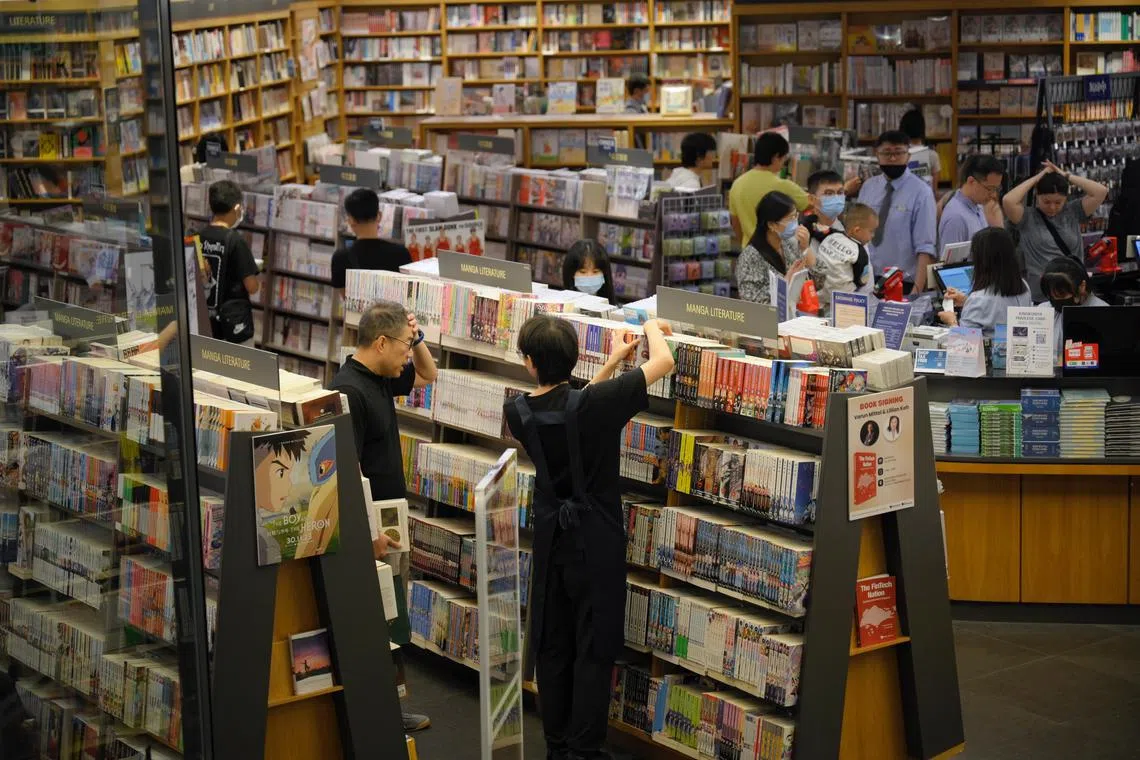Rent subsidy? GST exemption? Time to experiment with special measures to save bookshops, says book community
Sign up now: Get ST's newsletters delivered to your inbox

Many in the book community say it is now time to more boldly experiment with new policies before bookstores are erased from Singapore’s landscape.
PHOTO: ST FILE
Follow topic:
SINGAPORE –The same bad news, followed by the predictable public outcry.
For book lovers, Times’ recent closing of its two branches
But this latest development has also reignited fresh debate and injected the cause with new urgency. Many in the book community say it is now time to more boldly experiment with new policies before bookstores are erased from Singapore’s landscape.
Some are calling for bookshop rentals to be subsidised and for books to be exempt from the goods and services tax (GST).
Others say a discussion is due about whether the state-of-the-art libraries in Singapore are inadvertently killing bookshops, suggesting that how public funding for books is distributed between the two ecosystems should be relooked.
Sing Lit Station’s new station director, poet and critic Daryl Lim, is of the school that “the problem should now be obvious. It is rent, rent, rent”.
Citing the National Library Board’s (NLB) 2021 study on reading habits, he says Singaporeans are reading markedly more; bookshops struggling is not a reflection of less demand for them.
“We need landlords who are willing to provide discounts due to the unique social value of bookstores and, hopefully, some recognition from the authorities to support this subsidy or discount,” he says. “It is wishful thinking to imagine that bookstores will survive simply on the passion and sacrifices of booksellers.”
He points to landlord YTL subsidising Taiwan bookstore chain Eslite at its The Starhill mall in Kuala Lumpur, reported by
The Yeoh family – who run YTL – believe in the value of a destination bookstore as a way of differentiating the mall. This led them to grant a generous cut on rent and also guaranteed Eslite a longer tenancy so it can more assuredly invest in the space to enhance shoppers’ experience.
Lim adds: “A rent subsidy is the most effective measure if we, as a society, think there is some social and cultural value to having bookstores around.”
On bookstores’ claim to public monies, he says: “I do think that they have to demonstrate their value, through events that connect readers and writers, through supporting communities. Many bookstores I love have done this.”
Poet Joshua Ip, however, raises the uncomfortable point that Singapore’s public libraries fulfilling their roles “ridiculously well” may be the biggest spectre for bookstores.
“Libraries are far more ubiquitous and conveniently situated than any bookstore chain,” he says. “They have ridiculously vast collections, acquire new titles super-fast and have so much comfortable browsing space and no policy about plastic wrap on books.”
“You can take the books home. You can return them if you don’t like them. Being able to return books is a plus in space-starved Singapore more than anywhere else,” he adds.
The two are in competition for not just readers, but also spaces. Ip says libraries may be more attractive to malls because they are more likely to make rent consistently, while possibly touching more people’s lives, especially those with little disposable income.
He calls for a wider discussion between stakeholders on which future hypothetical is best for building a reading culture: an all-library model, or bookstores existing alongside libraries as subsidised public good purveyors.
The latter conclusion will require some redirection of public monies from NLB to bookstores. Since 2019, Beijing has spent 100 million yuan (S$18.9 million) each year to turn the fates of nearly 1,000 bookshops around. “I don’t know the answer,” Ip confesses.
He is not alone in lamenting the mixed blessing of having a well-run public library.
Author and Singlish advocate Gwee Li Sui calls it “the elephant in the room”. When libraries are pitted against bookshops, he says, bookshops – and by extension local publishers – will always lose.
“Every time I see someone say they support Sing Lit by posting a photo of a stack of borrowed books, my heart drops,” Gwee says.
NLB needs to study how libraries, bookshops and publishers co-create successful reading societies. “It is the only player in the reading ecosystem with a public responsibility to maintain its sustainability.”
Other suggestions, such as one by poet Koh Buck Song, include exempting book sales from GST so as not to tax reading, though whether these small savings will encourage enough people to buy more books at a critical enough scale is not clear.
Referring to the same 2021 NLB survey, writer and critic Ruby Thiagarajan highlights that only 33 per cent of those surveyed reported reading six or more books a year. “Singapore residents don’t read books at a high enough volume to sustain bookstores at Singapore rent prices,” she says.
Meanwhile, book business veterans like former senior director of Books Kinokuniya Kenny Chan and Landmark Books publisher Goh Eck Kheng note the importance of bookshops hiring book lovers – rather than just businessmen – to run stores, so that they can connect with readers, curate the right books and know what titles to display.
The Singapore Book Publishers Association (SBPA), established in 1968, says Singapore’s local books ecosystem faces many of the same structural challenges as the local television and newspaper industries.
While media outlets receive hundreds of millions of dollars in government support, publishers and booksellers receive almost none.
SBPA notes that Singapore is in a minority of countries that charges GST for books. For bookshops, help in any form will do.
“The survival of our booksellers and publishers in this environment is a testament to their entrepreneurial qualities and hard work, and to the core of readers who want to support literature and writing from Singapore.”
Correction note: In an earlier version of the story, we said that 42 per cent of those who were surveyed by NLB in 2021 said they read more than 6 books a year. This should be 33 per cent.


